NUR2299: Reflective Report on Chronic Care Practice Placement
VerifiedAdded on 2022/08/26
|5
|888
|27
Report
AI Summary
This report reflects on a nursing student's palliative care placement at Ipswich Hospital, Queensland, Australia. The student utilizes Gibb's reflective cycle to analyze their experiences in the palliative care unit, including treating cancer patients and providing hospice care. The report details the student's feelings before and after the placement, evaluating the benefits of the training and the emotional challenges of dealing with critical illnesses and patient deaths. The conclusion emphasizes the importance of practical experience and skill development in palliative care, with an action plan for future improvement and aligning care processes with nursing standards. The student also references relevant literature to support their reflection.
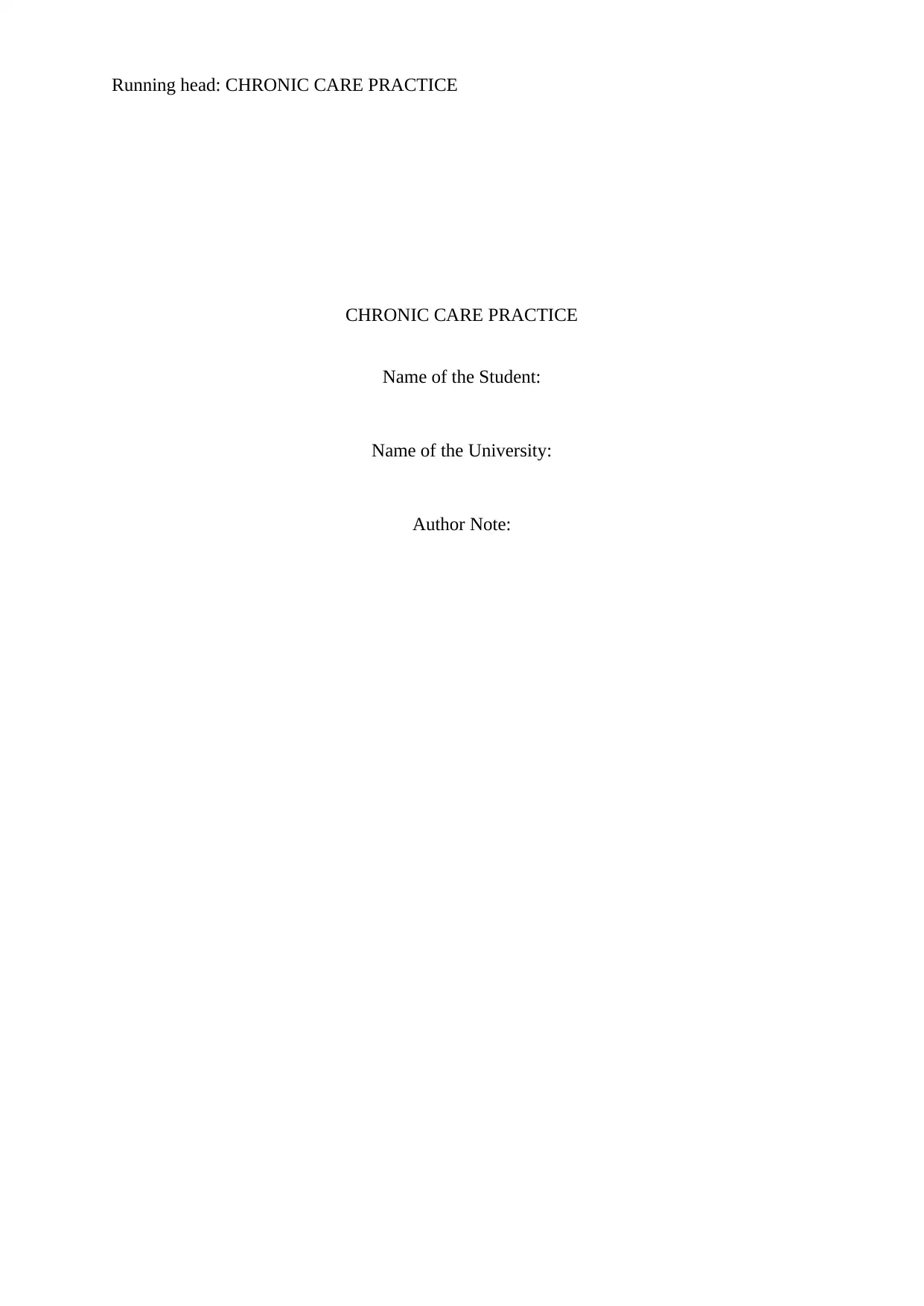
Running head: CHRONIC CARE PRACTICE
CHRONIC CARE PRACTICE
Name of the Student:
Name of the University:
Author Note:
CHRONIC CARE PRACTICE
Name of the Student:
Name of the University:
Author Note:
Paraphrase This Document
Need a fresh take? Get an instant paraphrase of this document with our AI Paraphraser
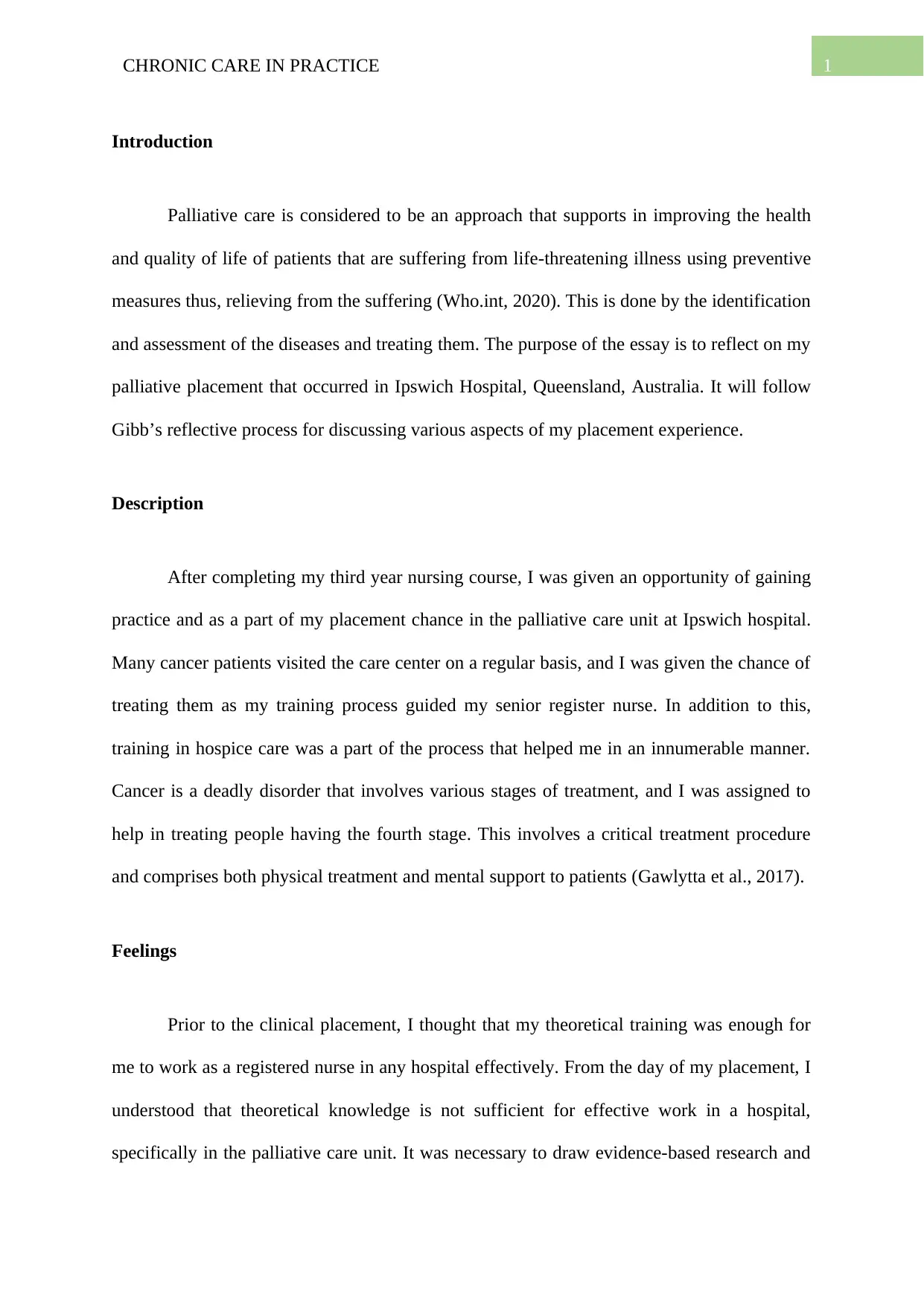
1CHRONIC CARE IN PRACTICE
Introduction
Palliative care is considered to be an approach that supports in improving the health
and quality of life of patients that are suffering from life-threatening illness using preventive
measures thus, relieving from the suffering (Who.int, 2020). This is done by the identification
and assessment of the diseases and treating them. The purpose of the essay is to reflect on my
palliative placement that occurred in Ipswich Hospital, Queensland, Australia. It will follow
Gibb’s reflective process for discussing various aspects of my placement experience.
Description
After completing my third year nursing course, I was given an opportunity of gaining
practice and as a part of my placement chance in the palliative care unit at Ipswich hospital.
Many cancer patients visited the care center on a regular basis, and I was given the chance of
treating them as my training process guided my senior register nurse. In addition to this,
training in hospice care was a part of the process that helped me in an innumerable manner.
Cancer is a deadly disorder that involves various stages of treatment, and I was assigned to
help in treating people having the fourth stage. This involves a critical treatment procedure
and comprises both physical treatment and mental support to patients (Gawlytta et al., 2017).
Feelings
Prior to the clinical placement, I thought that my theoretical training was enough for
me to work as a registered nurse in any hospital effectively. From the day of my placement, I
understood that theoretical knowledge is not sufficient for effective work in a hospital,
specifically in the palliative care unit. It was necessary to draw evidence-based research and
Introduction
Palliative care is considered to be an approach that supports in improving the health
and quality of life of patients that are suffering from life-threatening illness using preventive
measures thus, relieving from the suffering (Who.int, 2020). This is done by the identification
and assessment of the diseases and treating them. The purpose of the essay is to reflect on my
palliative placement that occurred in Ipswich Hospital, Queensland, Australia. It will follow
Gibb’s reflective process for discussing various aspects of my placement experience.
Description
After completing my third year nursing course, I was given an opportunity of gaining
practice and as a part of my placement chance in the palliative care unit at Ipswich hospital.
Many cancer patients visited the care center on a regular basis, and I was given the chance of
treating them as my training process guided my senior register nurse. In addition to this,
training in hospice care was a part of the process that helped me in an innumerable manner.
Cancer is a deadly disorder that involves various stages of treatment, and I was assigned to
help in treating people having the fourth stage. This involves a critical treatment procedure
and comprises both physical treatment and mental support to patients (Gawlytta et al., 2017).
Feelings
Prior to the clinical placement, I thought that my theoretical training was enough for
me to work as a registered nurse in any hospital effectively. From the day of my placement, I
understood that theoretical knowledge is not sufficient for effective work in a hospital,
specifically in the palliative care unit. It was necessary to draw evidence-based research and
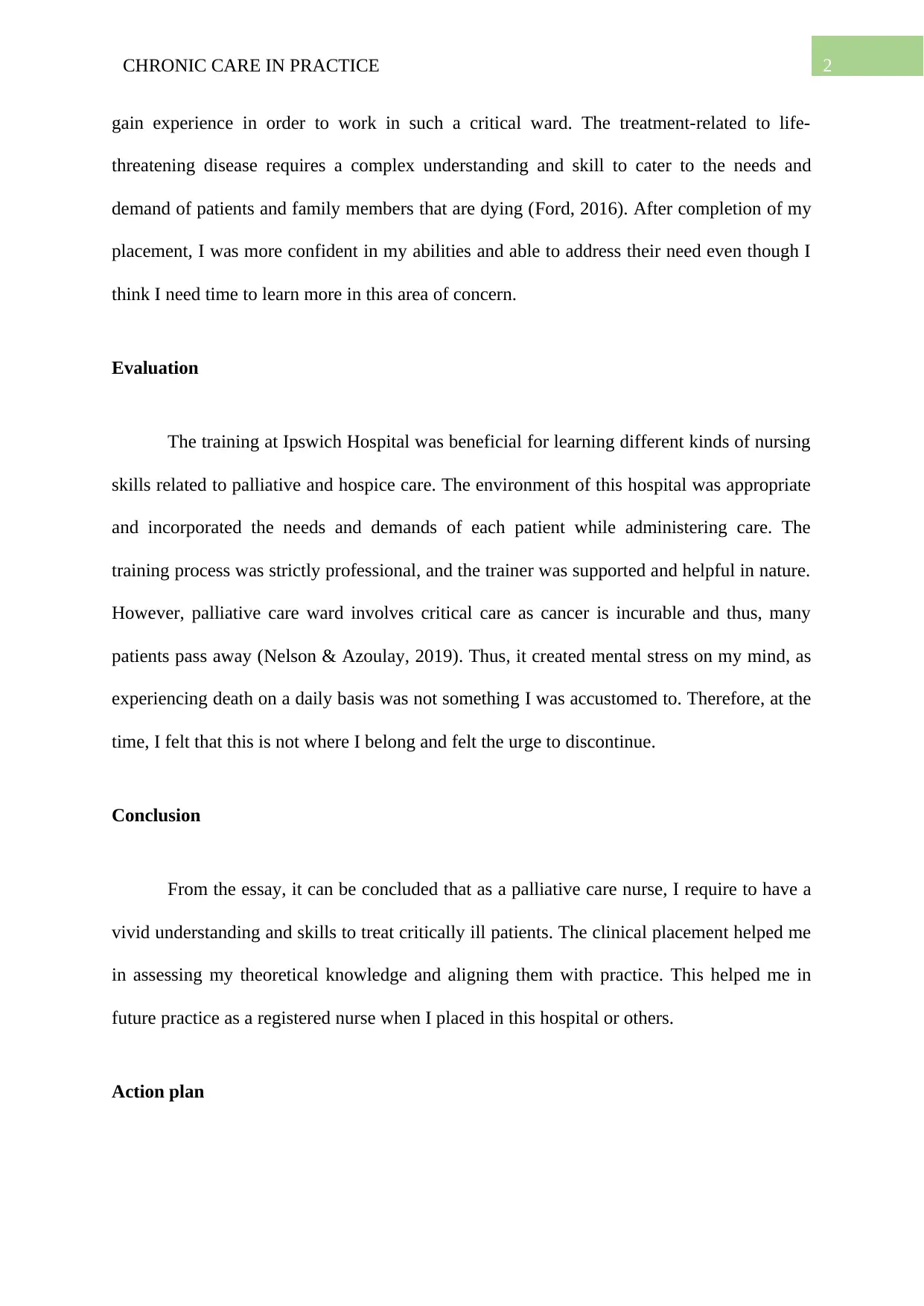
2CHRONIC CARE IN PRACTICE
gain experience in order to work in such a critical ward. The treatment-related to life-
threatening disease requires a complex understanding and skill to cater to the needs and
demand of patients and family members that are dying (Ford, 2016). After completion of my
placement, I was more confident in my abilities and able to address their need even though I
think I need time to learn more in this area of concern.
Evaluation
The training at Ipswich Hospital was beneficial for learning different kinds of nursing
skills related to palliative and hospice care. The environment of this hospital was appropriate
and incorporated the needs and demands of each patient while administering care. The
training process was strictly professional, and the trainer was supported and helpful in nature.
However, palliative care ward involves critical care as cancer is incurable and thus, many
patients pass away (Nelson & Azoulay, 2019). Thus, it created mental stress on my mind, as
experiencing death on a daily basis was not something I was accustomed to. Therefore, at the
time, I felt that this is not where I belong and felt the urge to discontinue.
Conclusion
From the essay, it can be concluded that as a palliative care nurse, I require to have a
vivid understanding and skills to treat critically ill patients. The clinical placement helped me
in assessing my theoretical knowledge and aligning them with practice. This helped me in
future practice as a registered nurse when I placed in this hospital or others.
Action plan
gain experience in order to work in such a critical ward. The treatment-related to life-
threatening disease requires a complex understanding and skill to cater to the needs and
demand of patients and family members that are dying (Ford, 2016). After completion of my
placement, I was more confident in my abilities and able to address their need even though I
think I need time to learn more in this area of concern.
Evaluation
The training at Ipswich Hospital was beneficial for learning different kinds of nursing
skills related to palliative and hospice care. The environment of this hospital was appropriate
and incorporated the needs and demands of each patient while administering care. The
training process was strictly professional, and the trainer was supported and helpful in nature.
However, palliative care ward involves critical care as cancer is incurable and thus, many
patients pass away (Nelson & Azoulay, 2019). Thus, it created mental stress on my mind, as
experiencing death on a daily basis was not something I was accustomed to. Therefore, at the
time, I felt that this is not where I belong and felt the urge to discontinue.
Conclusion
From the essay, it can be concluded that as a palliative care nurse, I require to have a
vivid understanding and skills to treat critically ill patients. The clinical placement helped me
in assessing my theoretical knowledge and aligning them with practice. This helped me in
future practice as a registered nurse when I placed in this hospital or others.
Action plan
⊘ This is a preview!⊘
Do you want full access?
Subscribe today to unlock all pages.

Trusted by 1+ million students worldwide
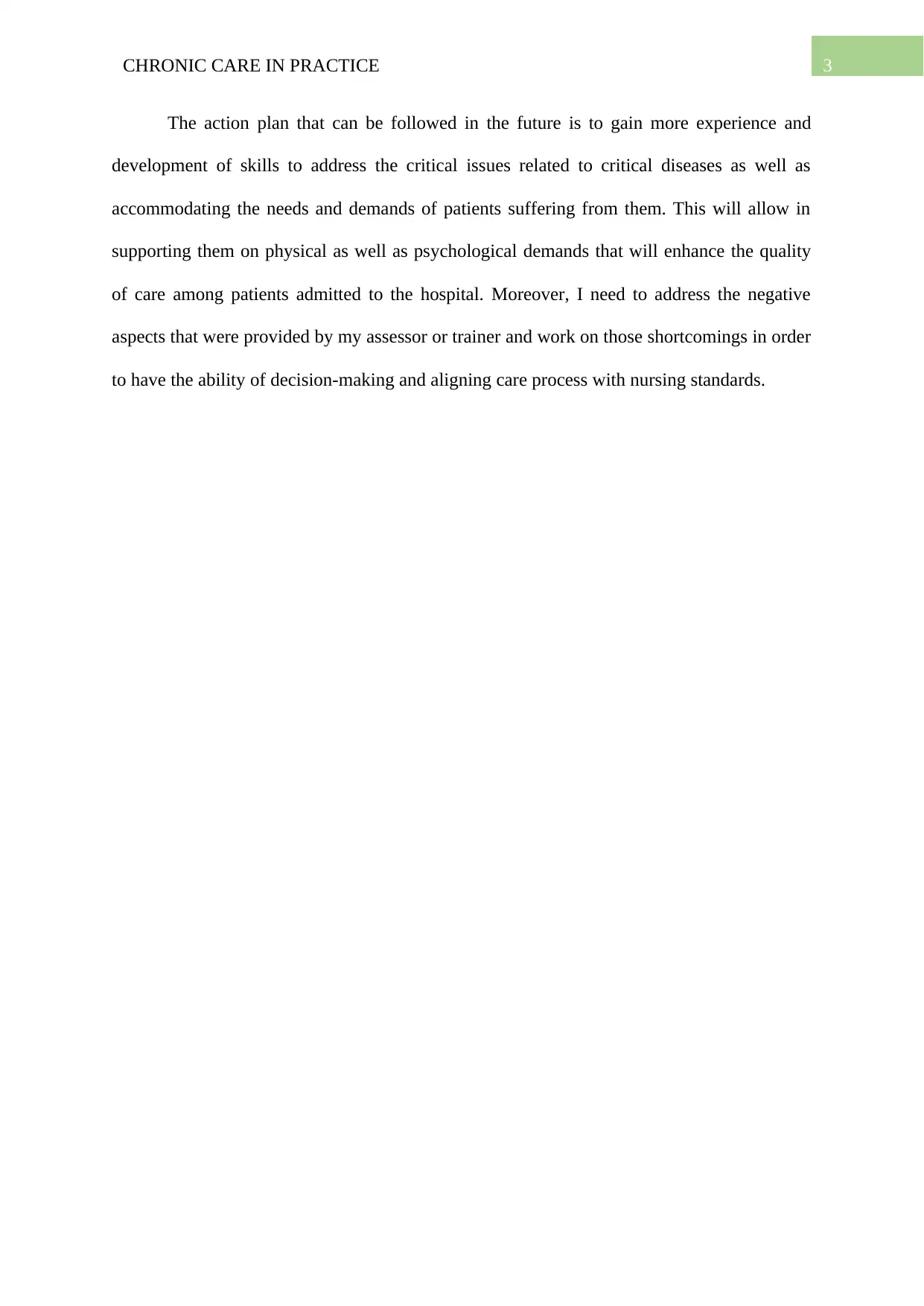
3CHRONIC CARE IN PRACTICE
The action plan that can be followed in the future is to gain more experience and
development of skills to address the critical issues related to critical diseases as well as
accommodating the needs and demands of patients suffering from them. This will allow in
supporting them on physical as well as psychological demands that will enhance the quality
of care among patients admitted to the hospital. Moreover, I need to address the negative
aspects that were provided by my assessor or trainer and work on those shortcomings in order
to have the ability of decision-making and aligning care process with nursing standards.
The action plan that can be followed in the future is to gain more experience and
development of skills to address the critical issues related to critical diseases as well as
accommodating the needs and demands of patients suffering from them. This will allow in
supporting them on physical as well as psychological demands that will enhance the quality
of care among patients admitted to the hospital. Moreover, I need to address the negative
aspects that were provided by my assessor or trainer and work on those shortcomings in order
to have the ability of decision-making and aligning care process with nursing standards.
Paraphrase This Document
Need a fresh take? Get an instant paraphrase of this document with our AI Paraphraser
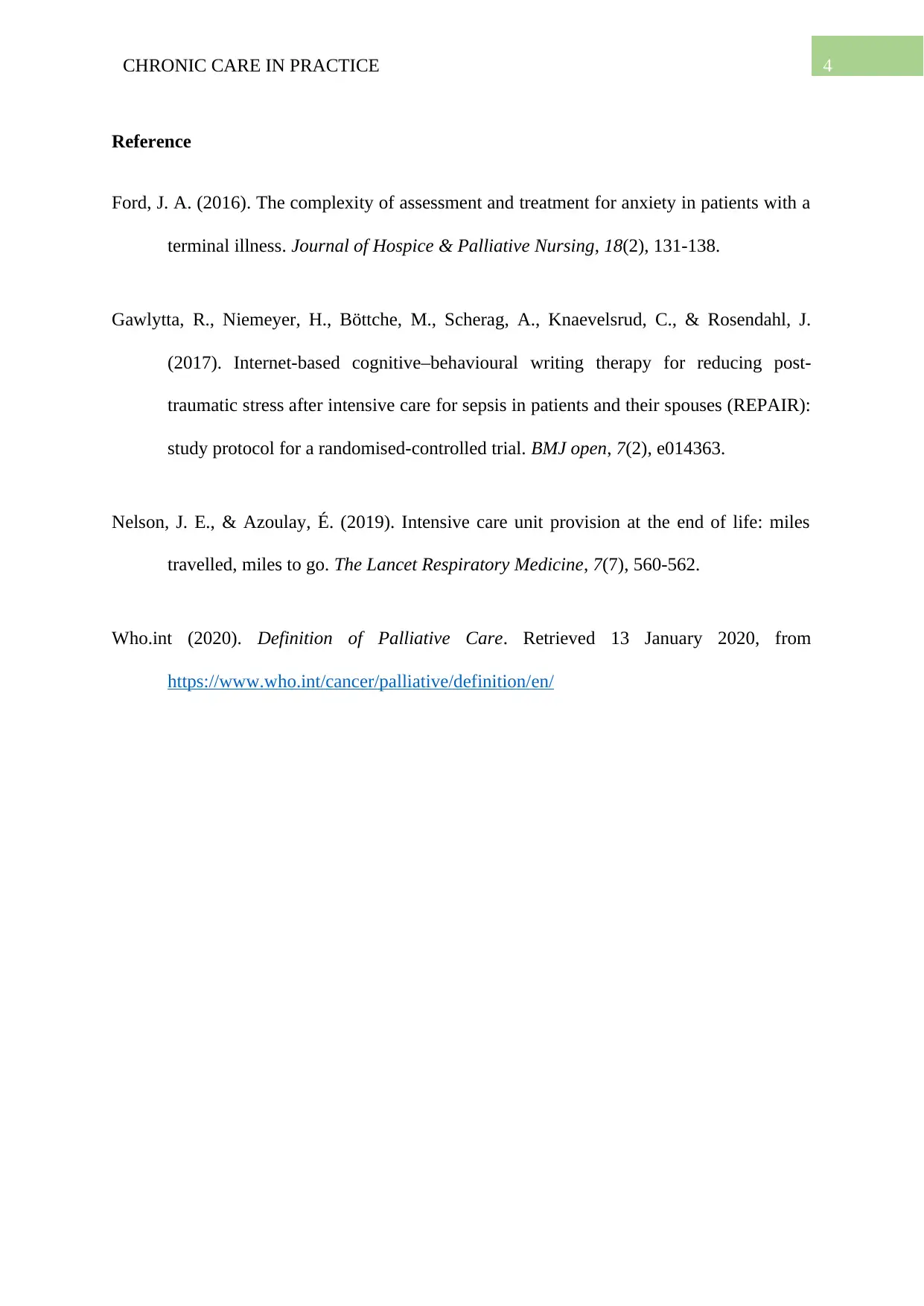
4CHRONIC CARE IN PRACTICE
Reference
Ford, J. A. (2016). The complexity of assessment and treatment for anxiety in patients with a
terminal illness. Journal of Hospice & Palliative Nursing, 18(2), 131-138.
Gawlytta, R., Niemeyer, H., Böttche, M., Scherag, A., Knaevelsrud, C., & Rosendahl, J.
(2017). Internet-based cognitive–behavioural writing therapy for reducing post-
traumatic stress after intensive care for sepsis in patients and their spouses (REPAIR):
study protocol for a randomised-controlled trial. BMJ open, 7(2), e014363.
Nelson, J. E., & Azoulay, É. (2019). Intensive care unit provision at the end of life: miles
travelled, miles to go. The Lancet Respiratory Medicine, 7(7), 560-562.
Who.int (2020). Definition of Palliative Care. Retrieved 13 January 2020, from
https://www.who.int/cancer/palliative/definition/en/
Reference
Ford, J. A. (2016). The complexity of assessment and treatment for anxiety in patients with a
terminal illness. Journal of Hospice & Palliative Nursing, 18(2), 131-138.
Gawlytta, R., Niemeyer, H., Böttche, M., Scherag, A., Knaevelsrud, C., & Rosendahl, J.
(2017). Internet-based cognitive–behavioural writing therapy for reducing post-
traumatic stress after intensive care for sepsis in patients and their spouses (REPAIR):
study protocol for a randomised-controlled trial. BMJ open, 7(2), e014363.
Nelson, J. E., & Azoulay, É. (2019). Intensive care unit provision at the end of life: miles
travelled, miles to go. The Lancet Respiratory Medicine, 7(7), 560-562.
Who.int (2020). Definition of Palliative Care. Retrieved 13 January 2020, from
https://www.who.int/cancer/palliative/definition/en/
1 out of 5
Related Documents
Your All-in-One AI-Powered Toolkit for Academic Success.
+13062052269
info@desklib.com
Available 24*7 on WhatsApp / Email
![[object Object]](/_next/static/media/star-bottom.7253800d.svg)
Unlock your academic potential
Copyright © 2020–2026 A2Z Services. All Rights Reserved. Developed and managed by ZUCOL.





